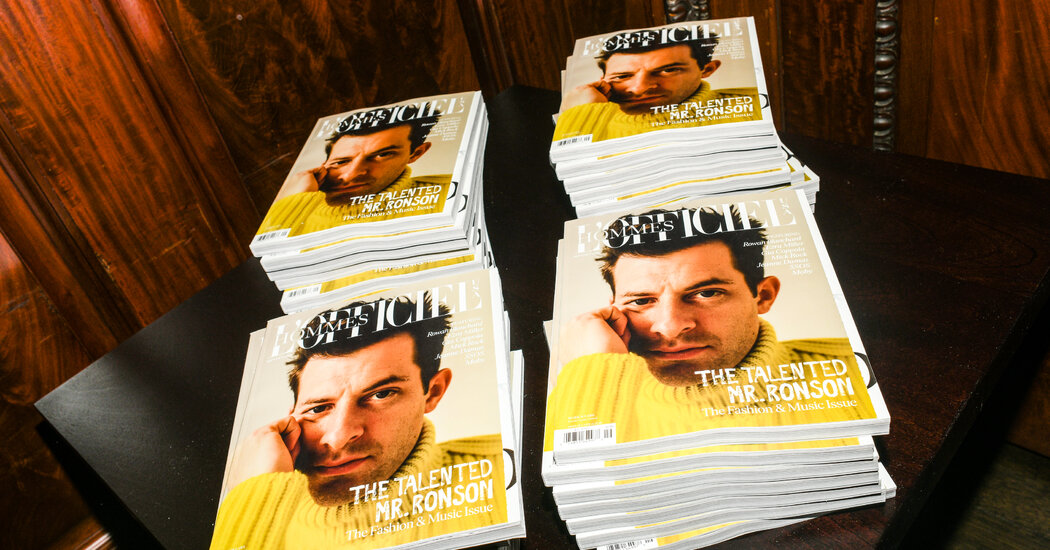
In 2017, the French magazine L’Officiel announced the creation of an American edition, L’Officiel USA, promising coverage of high fashion, art and travel through an international lens.
Over the next four years, that coverage included a series of video interviews about beauty; dispatches from the men’s fashion shows in Florence, Italy; articles about a vegan restaurant in SoHo and a national chain of marijuana dispensaries; and profiles of the singer Chaka Khan and the writer Elizabeth Wurtzel.
But this week, those articles were among many cited in a lawsuit filed against L’Officiel USA Inc. by the City of New York, on behalf of writers, producers, photographers, illustrators and more who said they were not paid for their work, or not paid in a timely manner. Peter Hatch, the commissioner of the Department of Consumer and Worker Protection, described the case as “corporate theft from New York City’s industrious creatives.”
In combining the experiences of two dozen workers, the suit is the first large so-called pattern-of-practice case in New York, Mr. Hatch said, brought forward under a 2017 law called the Freelance Isn’t Free Act. One provision of the law allows freelance workers to pursue late payments by filing complaints with the Department of Consumer and Worker Protection.
When the department receives a complaint, it responds by sending a written notice to the company named in the complaint, giving it 20 days to respond with either proof that the freelancer has been fully paid or acknowledgment that the freelancer hasn’t been paid (and an explanation as to why).
Often this is enough to get freelancers paid the money they are owed, Mr. Hatch said. But when the department began sending notices to L’Officiel USA in 2018, it “went silent on us,” he said. There are 24 complaints cited in the lawsuit; in all but two of them, the city said, the magazine did not respond to notices sent by the worker protection department.
The magazine’s top officials — the chairman of L’Officiel USA, the chief executive of L’Officiel Inc. in France and the chief creative officer for L’Officiel USA — did not respond to several emailed requests for comment for this article.
Freelancers who made complaints against L’Officiel described feeling ghosted. Many consider late payments to be an upsetting but fairly typical aspect of their working lives. Sometimes, publicly naming a delinquent company can hasten payment. But that wasn’t the case here, said Natasha Stagg, a writer who said she is owed $1,000 for her article on Ms. Wurtzel.
“I tweeted about the L’Officiel thing,” she said. “Instead of getting paid, I just got a ton of DMs from people who had also not gotten paid.”
It has also been demoralizing, Ms. Stagg said, to see the fashion magazine undergo a kind of rebranding in 2020 — reportedly boosted with several million dollars from an American investment firm — while some freelancers were already fighting L’Officiel in French courts.
In recent years, the fashion industry has faced scrutiny for its longtime practice of low wages for interns, entry-level workers, and contractors or freelancers. This practice often created conditions that allowed only those with wealth or a strong safety net to enter the field.
“I think the industry is so full of people who don’t work for money but for clout, or even the joy of being involved in fashion or publishing, and so not getting paid isn’t the biggest deal to them,” Ms. Stagg said. “They don’t want to ruffle feathers or make it seem like they need money because that’s antithetical to the image that they’re trying to project.”
Dean Quigley, who worked on contract as an art director for L’Officiel USA in the fall of 2019, is named in the complaint as being owed $15,320 — money, he said, that could have provided more stability at the start of the pandemic or helped him pay off student loan debt or medical expenses.
Now that he has a full-time job at a large retailer, joining the lawsuit was “less so about getting compensated, which I obviously would love,” Mr. Quigley said. “But more so that I don’t want companies like this to operate in this fashion.”
The lawsuit asks that the freelancers be granted double their unpaid wages, in addition to civil penalties paid to New York City and the installment of a court monitor to ensure L’Officiel changes its practices.
Mr. Hatch, the commissioner, acknowledged that court resolutions can come slowly but that bringing the lawsuit would help put “this industry on notice,” he said.
“If such a company has the resources to maintain a luxurious corporate image, it’s all the more unconscionable for them not to pay the actual creators of the content they sell.”






